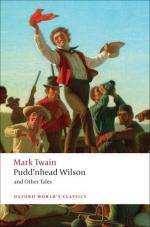’Smoke and read as much as you please, drink all the water you like. When you get hungry, ring and give your order, and I will decide whether it shall be filled or not. Yours is a stubborn, bad case, and I think the first fourteen dishes in the bill are each and all too delicate for its needs. I ask you as a favour to restrain yourself and not call for them.’
’Restrain myself, is it? Give yourself no uneasiness. You are going to save money by me. The idea of coaxing a sick man’s appetite back with this buzzard-fare is clear insanity.’
I said it with bitterness, for I felt outraged by this calm, cold talk over these heartless new engines of assassination. The doctor looked grieved, but not offended. He laid the bill of fare of the commode at my bed’s head, ‘so that it would be handy,’ and said:
’Yours is not the worst case I have encountered, by any means; still it is a bad one and requires robust treatment; therefore I shall be gratified if you will restrain yourself and skip down to No. 15 and begin with that.’
Then he left me and I began to undress, for I was dog-tired and very sleepy. I slept fifteen hours and woke up finely refreshed at ten the next morning. Vienna coffee! It was the first thing I thought of—that unapproachable luxury—that sumptuous coffee-house coffee, compared with which all other European coffee and all American hotel coffee is mere fluid poverty. I rang, and ordered it; also Vienna bread, that delicious invention. The servant spoke through the wicket in the door and said —but you know what he said. He referred me to the bill of fare. I allowed him to go—I had no further use for him.
After the bath I dressed and started for a walk, and got as far as the door. It was locked on the outside. I rang, and the servant came and explained that it was another rule. The seclusion of the patient was required until after the first meal. I had not been particularly anxious to get out before; but it was different now. Being locked in makes a person wishful to get out. I soon began to find it difficult to put in the time. At two o’clock I had been twenty-six hours without food. I had been growing hungry for some time; I recognised that I was not only hungry now, but hungry with a strong adjective in front of it. Yet I was not hungry enough to face the bill of fare.
I must put in the time somehow. I would read and smoke. I did it; hour by hour. The books were all of one breed—shipwrecks; people lost in deserts; people shut up in caved-in mines; people starving in besieged cities. I read about all the revolting dishes that ever famishing men had stayed their hunger with. During the first hours these things nauseated me: hours followed in which they did not so affect me; still other hours followed in which I found myself smacking my lips over some tolerably infernal messes. When I had been without food forty-five hours I ran eagerly to the bell and ordered the second dish in the bill, which was a sort of dumplings containing a compost made of caviar and tar.




